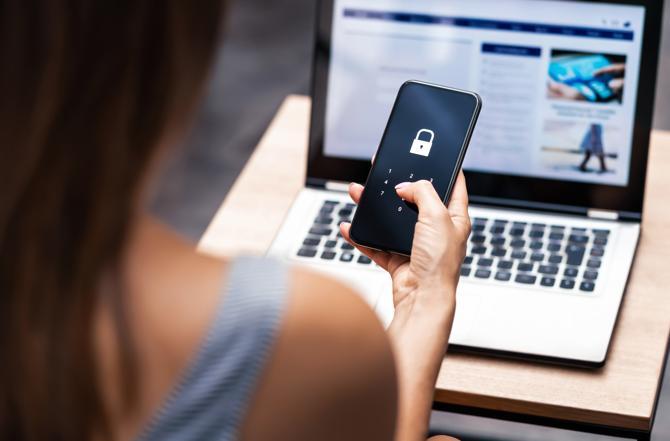
What is Mobile Security
Mobile security means applying measures to strengthen your device’s defenses against risks such as data breaches, unwanted surveillance, ransomware, or scamming methods used with malicious intent.
In 2014, there were approximately 1 billion smartphone users, but as of 2024, there are now more than 4 billion. While this is terrific for users, it also means an increasingly large number of individuals are looking to take advantage. In 2023, Kaspersky blocked 33.8 million malware, adware, and riskware attacks on mobile devices alone. This represents a clear upward trend in attacks on mobile devices, up more than 50% compared with the 22.3 million attacks recorded in 2022.
Connectivity to the internet is easily considered a necessity in the modern age. However, there are risks associated with it that we simply cannot ignore. It doesn’t matter if it is your child’s tablet or your work cell phone, if you’re not vigilant about your device security, you can easily become a target.
Types of Mobile Security
A quick online search for ‘security for my phone’ generates hundreds of results. But before you jump into any solutions, there are three different areas to investigate to ensure your mobile device security is as effective as possible.
Applications?
Apple or Android phone security starts with apps. A lot of your personal information is stored on your phone. Apps require permission from you to gain access to this information so that it can operate as designed. However, excessive access allows that application to gather more data than it needs.
Networks
Connecting to public networks compromises cyber security for mobile phones. As these are unsecured, it is easy for unverified individuals to intercept your connection and access the data in real-time. Alternatively, people can install stalkerware on your device without you knowing, allowing them to monitor your private life and movements.
Device
If your phone gets stolen, aside from you losing access to everything stored on it, anyone holding your device can access everything. By having passcodes, biometric logins, and tracking set up, if someone takes your phone, they won’t be able to access the information.
How Does Mobile Security Work?
There are various aspects of mobile security which can work together to keep your device safe, from good practice in the way you use your device to products and apps with security functionality. Some of these include:
- Anti-virus, anti-Malware, and anti-Ransomware stop mobile devices' security threats before they can harm your system, by detecting suspicious behavior from apps or installations before they can take effect. A strong antivirus solution is the first line of defense for your devices.
- VPN (virtual private network) allows you to browse the web safely, especially on public networks. By disguising your data in real-time, it’s impossible for your online activities to be tracked.
- A password manager allows you to securely store highly sensitive information, such as email passwords and bank or credit card details. An effective password keeper suggests strong passwords and automatically syncs it across devices.
- Monitoring apps, designed for parents to track the device habits of kids, balance screen time, and restrict sites that are unsuitable for children or adolescents. Parents can approve or shut off access at any time via their device.
Benefits of mobile security
Good mobile security keeps your data safe
Personal data is not just your address or contactable details but a broad spectrum of identifiable assets or information such as your IP address, credit card details, medical history, etc. Data is a valuable source of information for individuals or organizations. When your phone security is compromised, vital information can be stolen, such as access to banking and even your identity.
Mobile security for families may include tracking capabilities for peace of mind
Whether you have children with devices or a personal phone for work, additional mobile security is a must. Parents can acquire apps that can monitor their kid’s online activities and consensually track theirs or their mobile’s whereabouts. For your personal work devices, tracking apps can notify you if these devices are being used without your consent.
Mobile security is part of broader online security
Young children or even you are susceptible to breaches. Whether it’s playing online games, using social media apps like TikTok, or accessing international content, being safe is key across devices. Certain apps allow you to monitor your children’s internet activity, content consumption, screen time, and whereabouts, safely and securely.
Threats to mobile security
Kaspersky detects over 14 million cyberthreats in real-time, across the globe. These threats can manifest in several ways, including –
Adware
According to Kaspersky Security Network, adware was the most common threat to mobile devices, with 40.8% of threats detected falling into this category. Although not all adware is malicious, it can open the door to other more harmful software.
Data leaks
Several instances can lead to your data being leaked, and permissions for apps, especially those listed as free, are one of them. In 2021, the Apple iOS 14 update enabled app-tracking transparency, allowing users to decide whether their app usage data could be shared with the business associated with it.
Unsecured Wi-Fi
Public Wi-Fi risks are incredibly high because they are unsecured networks. This means that any information you’re accessing on your device via these networks can easily be intercepted by hackers. Similar to this is network spoofing, which is when hackers create fake access points that look like accessible networks but are used to intercept data.
Phishing attacks
With your email or cell number already acquired, fraudsters use deceptive communications to trick you into disclosing sensitive information. In some instances, you can receive an email, phone call, instant message, or SMS that looks like it’s from a legit supplier – however, the information you provide grants access to highly confidential assets such as banking details.
Spyware/Stalkerware
Hackers or known individuals can install tracking apps on mobile devices to access your phone information, apps, and/or your location in real-time. In 2022, Kaspersky found almost 30,000 users were affected by stalkerware.
Malware on phones
Malware, short for malicious software, is software that is installed on your phone to cause harm to you or your device, for instance by capturing sensitive data. Mobile phone malware can have a range of problematic impacts, such as banking profiles being infiltrated, files being stolen and held for ransom, or being locked out of accounts. Users may come across malware via suspicious links in communication apps.
Cyberterrorism
Individuals who work for large-scale enterprises or government entities are more attractive targets of phone hacking, as they are likely to have access to large amounts of data or highly sensitive information.
Mobile device security best practices
Without proper cell phone security, anyone is vulnerable to phone hacking. If you don’t have the necessary software, or conduct unsafe practices on your device, you may not even know that you were hacked.
Key things to look for that might indicate that your phone has been hacked are:
- Your phone loses charge quicker than usual
- Operating your phone is slower
- Unfamiliar calls or texts in your history
- Suspicious activity on online accounts
Even if there are no signs that your security is compromised, it’s important to adhere to mobile device security best practices to protect yourself from any future instances.
Keep operating systems updated
When a new cyber threat is released, operating systems undergo updates to ensure their users are protected. By not updating, you leave your phone vulnerable to potential mobile phone security threats.
Use software that keeps your family safe
Control what kids are seeing, track their whereabouts privately, and monitor their device and website usage. Kaspersky’s Safe Kids solution can make this straightforward, helping you to protect your children from negative online experiences.
Disable remote connectivity
When you’re going into public spaces, turn off your Bluetooth, Airdrop, and Wi-Fi connection so that others cannot access your device.
Allow limited permissions for apps
When downloading apps, be sure to check what information the app is using and processing and put necessary restrictions in place. If you encounter an app on your phone that you didn’t download, you should delete it immediately.
Check apps before downloading
Only download apps from official stores, such as Google Play (Android), the App Store (Apple), RuStore in Russia, or AppGallery and GetApps in China. Ensure to check reviews, privacy policies, and required permissions of apps before installing, to know where your data is being used.
Use biometric access
Using your face or fingerprint as additional mobile phone security protection ensures that if your device is stolen, the perpetrator won’t have access to your information right away.
Enable two-factor authentication (2FA)
This verification method means that you confirm via an additional method, such as SMS or email code, to ensure that it’s you entering a personal platform or making payments online. With you can securely generate two-factor verification keys for an extra layer of security using in-app authenticator function.
Create different and complex passwords
Having a complex or ‘hard’ password for websites, especially ones such as banking, personal email and any other app that holds personal information, is crucial. While it may not stop hackers from accessing your platforms, it makes it a lot more challenging for them, and improves your chances of them giving up.
Install legitimate cyber security mobile apps
Find reputable software that suits your needs for both desktop and cell phone security, especially if you’re accessing public Wi-Fi networks often. This prevents hackers from getting into your phone by notifying you beforehand.
Protect your business information
It only takes one unmonitored device for major data breaches to happen. If your job requires the use of mobile devices, take extra precautions for your mobile threat defense and if you can, opt for a completely separate device.
Products to boost mobile security
1. Kaspersky Mobile Security Solution
Kaspersky’s mobile protection app provides comprehensive coverage for your smartphone, protecting your privacy through the Superfast VPN, providing anti-malware and anti-phishing functionality, and antivirus protection for Android devices.
This software generates a strong and secure passwords and syncs them across your devices. It operates by using a master keyword that you create to access an encrypted private vault. In addition to your passwords, this vault can be used to store private information such as bank card details, one-time passwords (OTP) for services for 2FA, documents, and photos.
3. Kaspersky VPN Secure Connection
A VPN (virtual private network) creates a secure tunnel, creating a safe and secure way to browse the web. This tool connects via 2000+ servers in over 100 locations, keeping you and your data secure, even when using public Wi-Fi. By keeping your IP address hidden, it prevents devices from becoming susceptible to hackers.
A multi-functional monitoring app that allows parents to track children’s online use. From the parental control app, you can restrict content, monitor their usage, enable extensive web filtering, and balance screen time.
Related Articles


